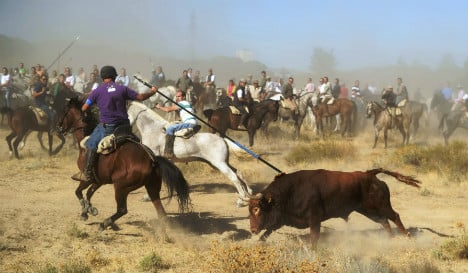Insults and fisty-cuffs were exchanged during the first Toro de la Peña, an event designed to replace the Toro de la Vega, now that the practice of spearing a bull to death has been banned.
Mounted police kept the peace among crowds as hundreds gathered to witness or participate in the event in Tordesillas, a town 200km northwest of Madrid.
Traditionally men on horseback and on foot chased a chosen bull through town attempting to stab it to death with a spear. The victor won the privilege of parading through the town brandishing the bull’s testicles on his lance.
But amid increasing protests by animal rights activists, the regional government of Castilla y León introduced a ban against the killing of bulls at town festivals unless it took place in the context of a traditional bullfight in the bullring.
Instead revellers were allowed to chase to the bull to the pen in the outskirts of the town with sticks, but were forbidden from killing it.
Some had threatened to defy the ban, but despite the fierce words between animal rights protesters and locals supporting the tradition, there were no arrests and the bull was unhurt.
Police ensured the bull, a 670-kilo (1,500-pound) beast named Pelado – “Bare” in Spanish, was spared from anyone looking to defy the law as heavy rain cut short the event.
Ricardo Garcia, who was decked out in black, said he came from Madrid with a group of friends to “ensure the law is respected”.
Locals in the town of around 9,000 people held a protest in defence of the traditional bull-spearing festival.
They chanted: “Tordesillas does not give up!” and “Animal defenders are terrorists!”
Scuffles between animal rights activists and locals have been a regular occurence at the festival in recent years, contributing to the pressure to ban bull spearing.
While the activists welcome the ban, they complain the bull still suffers stress as it is chased and it is destined to be killed in the slaughterhouse in the end.
But for many locals the bull-spearing festival was a source of intense pride.
Local resident Omar Lumar proudly displays the head of a bull named Vulcano, killed in the festival in 2003, on the wall of his home.
Residents accuse the activists of “distorting” the reality of the festival to portray them as “savages”.
“We have taken it really badly. These laws are a question of power, not of justice,” Gerardo Abril, president of the festival's organising board, told AFP.
“It is incredible that in villages we have our traditions, and they take them away from us in cities,” he added in a reference to Valladolid, the capital of Castile and Leon which passed the ban.
Abril, a plumber who was gored seven times by a bull at the festival in 2011, said he has been vilified within the far-left United Left party to which he belongs because of his support for the festival.
A self-described feminist, he wore a red handkerchief with a small image of a bull and Marxist guerrilla leader Ernesto “Che” Guevara around his neck.
Feelings over the ban have spilled over to the ballot box. In June's general election, 13.2 percent of votes cast in Tordesillas were blank – the highest level in the country, comparing to a national average of just 0.94 percent.
Animal rights party Pacma, which spearheaded efforts to ban the festival, won a record number of votes in the polls – nearly 235,000, although this was not enough to enter parliament.
The bull-spearing festival was banned once before, between 1966 and 1969 during the dictatorship of General Francisco Franco.



 Please whitelist us to continue reading.
Please whitelist us to continue reading.
Member comments